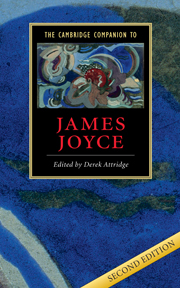Book contents
- Frontmatter
- 1 Reading Joyce
- 2 Joyce the Irishman
- 3 Joyce the Parisian
- 4 Joyce the modernist
- 5 Dubliners
- 6 Stephen Hero and A Portrait of the Artist as a Young Man
- 7 Ulysses
- 8 Finnegans Wake
- 9 Joyce’s shorter works
- 10 Joyce and feminism
- 11 Joyce and sexuality
- 12 Joyce and consumer culture
- 13 Joyce, colonialism, and nationalism
- Further reading
- Index
- Series List
9 - Joyce’s shorter works
Published online by Cambridge University Press: 28 May 2006
- Frontmatter
- 1 Reading Joyce
- 2 Joyce the Irishman
- 3 Joyce the Parisian
- 4 Joyce the modernist
- 5 Dubliners
- 6 Stephen Hero and A Portrait of the Artist as a Young Man
- 7 Ulysses
- 8 Finnegans Wake
- 9 Joyce’s shorter works
- 10 Joyce and feminism
- 11 Joyce and sexuality
- 12 Joyce and consumer culture
- 13 Joyce, colonialism, and nationalism
- Further reading
- Index
- Series List
Summary
At first glance, Joyce's shorter works - his poems and epiphanies, Giacomo Joyce, and Exiles - seem to bear only the most tenuous relationship to the books for which Joyce has become famous. It is only by an exercise of the imagination that the epiphanies and Giacomo Joyce can even be called 'works'; Joyce published neither in its original form, choosing instead to loot them for the more ambitious undertakings that followed, and neither received the painstaking polish that Joyce lavished on his more ambitious productions. Only forty of at least seventy-one epiphanies are extant and their relationship to one another had to be reconstructed from manuscript evidence; the sketches that comprise Giacomo Joyce were similarly composed, arranged, and abandoned, but not destroyed. Chamber Music, although published in 1907, was orphaned when Joyce delegated the final arrangement of the poems to his brother Stanislaus. Pomes Penyeach, as the title suggests, is a modest offering of twelve and a tilly poetic 'fruits'. Only Exiles continued to hold Joyce's interest as an autonomous composition not destined for immediate verbal recycling.
The status of the shorter works as successful, original, or even finished compositions has always been in question; even in more subjective terms, however, they seem to offer few of the rewards of their longer and better known counterparts. First, and most damagingly, they are humourless; what humour may be discerned in them is bitter or ironic, inspired by pained defiance (as in ‘Gas from a Burner’) or jaded cynicism (‘In my time the dunghill was so high’ – E 43). Secondly, they are spare, denuded of the variable styles and elaborate contexts that make Ulysses and Finnegans Wake seem inexhaustible. Finally, they are easily dismissed as immediately derivative of both Joyce’s experiences and his reading.
- Type
- Chapter
- Information
- The Cambridge Companion to James Joyce , pp. 172 - 195Publisher: Cambridge University PressPrint publication year: 2004
- 2
- Cited by



